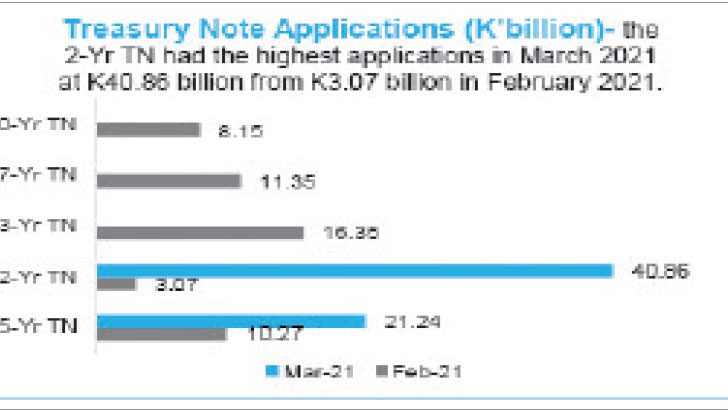Investors shift to long term instruments
Appetite for long term instruments is fast picking evidenced by Reserve Bank of Malawi (RBM) data which shows Treasury bills applications have been on the decline while Treasury notes have been on the increase.
This according to analysts is due to the attractive rates offered on the long term instruments.

The data contained in Bridgepath Capital Limited economic report for March shows that while Treasury bills applications decreased by 55.95 percent to K33.13 billion in March from K75.19 billion in February, Treasury note applications increased by 26.25 percent to K62.10 billion in March from K49.19 billion in February.
The data shows that year-on year, total Treasury Bills applications also decreased by 55.41 percent as they were K74.29 billion in March 2020 while Treasury notes applications have increased by 65.78 percent as they were K37.46 billion during the same period in the previous year.
In terms of allotments, Treasury bills also decreased by 12.63 percent as they were K37.92 billion in March 2020 while for Treasury notes allotments, they increased by 74.82 percent as they were K34.07 billion in March 2020.
Investment and market analyst Cosmas Chigwe said in an interview the growing demand for long term instruments is due to the attractive rates placed on long term securities
“Monetary authorities are simply placing and accepting much higher yields and more applications on long term securities to force the market to place in their investments in long term to effectively restructure their debt,” he said.
In recent times, Treasury has shifted focus to long term borrowing, moving away from short term borrowing, a development analysts have described as a positive move towards debt restructuring.
Bridgepath Capital Limited chief executive officer Emmanuel Chokani speaking earlier to Business News noted that long-term debt instruments will help government to restructure its debt.
“This, as part of government financing of debt, is a positive move similarly to investors because if they want to sell they can sell. Analysts are looking for a home for investments and they will surely bid for it as part of their asset allocation but also for the good yields,” he said in an earlier interview.
Similarly, Alliance Capital Limited research manager Bond Mtembezeka observed earlier that government’s shift to long term instruments is the way to go now that government is struggling with debt.
Currently, Malawi’s debt stock has been on the rise, hitting a record K4.76 trillion by December last year, which is double the value of the revised 2020/21 fiscal plan pegged at K2.3 trillion.
The increase in debt stock from the K4.13 trillion recorded in June last year means that public debt rose by K630 billion on a monthly basis.
Out of the K4.76 trillion total public debt stock, domestic stock alone accounts for K2.72 trillion or 31 percent of the country’s nominal gross domestic product (GDP).





